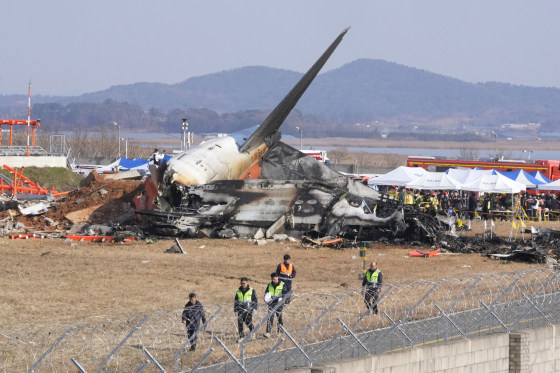A devastating air disaster unfolded in South Korea on Sunday morning when a Jeju Air flight crashed at Muan International Airport, claiming at least 85 lives. The plane, carrying 175 passengers and six crew members, veered off the runway during landing and erupted into flames, creating a scene of horror and chaos. The incident, which occurred around 9:03 a.m. local time, has left the nation in mourning and sparked urgent calls for accountability and answers.
The flight originated from Bangkok, Thailand, and was nearing its final destination when disaster struck. Officials have suggested that a malfunction in the landing gear may have been a critical factor, exacerbated by adverse weather conditions and the possibility of a bird strike. The crash unfolded rapidly, and despite firefighters extinguishing the blaze within 43 minutes, the toll was catastrophic. Among the dead, 45 were women and 35 were men, while the identities of many victims remain unknown. Only two survivors—a passenger and a crew member—were rescued from the wreckage and are currently in critical condition.
Jeju Air’s CEO, Kim E-bae, issued a public apology, expressing profound sorrow and taking full responsibility for the tragedy. “We extend our deepest condolences to the families of those who lost their lives and pledge our unwavering support during this difficult time,” Kim said. The airline has committed to assisting the bereaved families and cooperating fully with investigations into the disaster.
South Korea’s acting president, Choi Sang-mok, has mobilized national resources to address the crisis. Emergency personnel, including over 700 workers from various agencies, have been dispatched to the site to recover victims and search for the 94 individuals still missing. The Ministry of National Defense has also deployed military units and equipment to aid in rescue and recovery operations. A makeshift mortuary has been established at the airport to house the deceased, and grief-stricken families have begun the painful task of identifying their loved ones.
The crash has raised critical questions about aviation safety and emergency preparedness. Jeju Air, one of South Korea’s largest low-cost carriers, has faced scrutiny in the past for its maintenance standards and pilot training programs.
The incident has highlighted vulnerabilities in safety protocols, particularly in adverse weather conditions, and has renewed calls for stricter oversight of regional airports like Muan International.
The broader implications of the tragedy extend beyond the immediate loss of life. International aviation experts are expected to join the investigation to determine the exact cause of the crash. Preliminary reports point to a combination of technical failures and environmental factors, but a definitive conclusion could take months.
This incident has prompted South Korea’s aviation industry to commit to reviewing safety measures and ensuring such a disaster does not occur again.
The local community around Muan International Airport has come together in an extraordinary display of solidarity. Residents have provided food, water, and shelter to emergency workers and grieving families. Vigils have been held by religious leaders, offering prayers for the victims and their loved ones. The nation’s collective grief has also been echoed online, with messages of support and condolences pouring in from across the world under hashtags like #PrayForMuan and #JejuAirTragedy.
The government has promised a thorough investigation into the crash, with Minister of Land, Infrastructure, and Transport Park Sang-woo pledging transparency and accountability. While the immediate priority remains rescuing survivors and supporting the families of the victims, there is a growing demand for answers about how this tragedy occurred. The crash serves as a stark reminder of the need for robust safety measures and rigorous training within the aviation sector.
As South Korea grapples with this tragedy, the focus remains on recovery and healing. The lives lost in this disaster cannot be replaced, but the resolve to learn from it and prevent future tragedies is stronger than ever. For the families of the victims, closure will come slowly, but the nation stands united in its grief and determination to honor those lost.




